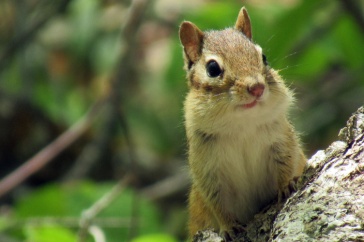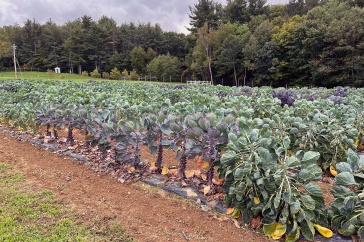
Vine-ripened cantaloupe are delicious, yet few New Hampshire gardeners grow them. Come learn virtually about proven tips and solutions for growing great melons including how to select and prepare a growing site, varieties adapted to our area, when to start and transplant, how to accelerate the growth of your melons, how to manage pests and diseases, how to fertilize, and when to harvest.
New Hampshire Agricultural Experiment Station researcher Becky Sideman will discuss “Growing Melons in New Hampshire Gardens” from 6 to 7 p.m. Thursday, Sept. 17, 2020, on Ask UNH Extension’s Granite State gardening series on Facebook. RSVP at https://www.facebook.com/events/320533399034569/.
“Given that a vine-ripened melon is one of the most divine treats of summer, it is surprising that few northern New England gardeners grow them” said Sideman, professor of sustainable agriculture and food systems and sustainable horticulture specialist with UNH Cooperative Extension.
According to the 2017 Census of Agriculture, New Hampshire has 50 farm that grow melons. That’s an increase of 30 farms from 2012. Vegetables, melons, potatoes, and sweet potatoes are New Hampshire’s third-largest agricultural market, with annual sales of nearly $18 million.
Melon varieties commonly fall into five classes: western and eastern muskmelons, honeydew, Galia, and Charentais. Some have netting—the network of corky lines that cover the rind—and sutures—the green lines that divide the rind into sections, and they have different flesh colors and flavors.
“There are excellent varieties of all of these types that will do well in New Hampshire gardens, in large part due to the work of Dr. Brent Loy. For over fifty years, Brent was a plant breeder at UNH who developed many of the melon varieties that are now considered standards. He focused on outstanding flavor and performance in Northern climates. Brent grew countless melon crops in recent decades, and he had developed an eight-step program aimed at market gardeners who want to successfully grow melons in New Hampshire,” Sideman said.

gardens, in large part, due to the work of Dr. Brent Loy, UNH professor
emeritus and long-time New Hampshire Agricultural Experiment Station
researcher.
Loy’s Eight-Step Program for Growing Melons—which you can read here—were developed from his extensive research work as part of the New Hampshire Agricultural Experiment Station. “These simple tips can help anyone grow melons successfully, and I’m thankful that he shared it. Beyond that, I am grateful for his decades of work developing outstanding melon varieties that perform well for Northern gardeners,” she said.
Loy, UNH professor emeritus and long-time New Hampshire Agricultural Experiment Station researcher, died, July 24, 2020. He was 79. Loy’s experiment station-funded work, which had largely taken place at the station's Kingman Research Farm, Woodman Horticultural Research Farm, and Macfarlane Research Greenhouses, has resulted in the development of more than 80 new varieties of squash, pumpkins, gourds, and melons during his career. His work represents the longest squash and pumpkin breeding program in North America, and his seed varieties are sold in seed catalogs throughout New England and the world.
This material is based upon work supported by the NH Agricultural Experiment Station, through joint funding of the National Institute of Food and Agriculture, U.S. Department of Agriculture, under award numbers 1019740, 1017757, 1017712, 0233556, 0233554, 0222873, 0217657, 0211639, 0198401, and 0006822, and the state of New Hampshire.
Founded in 1887, the NH Agricultural Experiment Station at the UNH College of Life Sciences and Agriculture is UNH’s original research center and an elemental component of New Hampshire's land-grant university heritage and mission. We steward federal and state funding, including support from the USDA National Institute of Food and Agriculture, to provide unbiased and objective research concerning diverse aspects of sustainable agriculture and foods, aquaculture, forest management, and related wildlife, natural resources and rural community topics. We maintain the Woodman and Kingman agronomy and horticultural research farms, the Macfarlane Research Greenhouses, the Fairchild Dairy Teaching and Research Center, and the Organic Dairy Research Farm. Additional properties also provide forage, forests and woodlands in direct support to research, teaching, and outreach.
The University of New Hampshire is a flagship research university that inspires innovation and transforms lives in our state, nation and world. More than 16,000 students from all 50 states and 71 countries engage with an award-winning faculty in top ranked programs in business, engineering, law, liberal arts and the sciences across more than 200 programs of study. UNH’s research portfolio includes partnerships with NASA, NOAA, NSF and NIH, receiving more than $100 million in competitive external funding every year to further explore and define the frontiers of land, sea and space.
-
Written By:
Lori Tyler Gula, Ph.D., '19 | NH Agricultural Experiment Station | lori.gula@unh.edu | 603-862-1452

















































